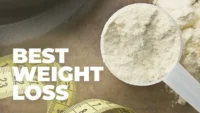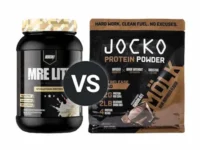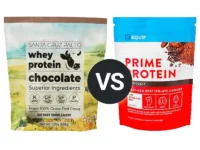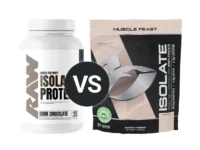Knowledge BaseYou're Questions Answered
What is better, lean or ripped protein powder?
The choice between lean and ripped protein powder depends on your specific fitness goals and dietary needs. Both types of protein powders are formulated to support different outcomes, so understanding what each offers can help you decide which is better for you.
1. Lean Protein Powder
Lean protein powders are typically designed for individuals who are looking to build muscle while minimizing fat gain. These protein powders usually have a higher protein content with minimal fats and carbohydrates. They are often marketed towards those who want to increase muscle mass without adding excess calories from fats or sugars.
- Low Calorie Content: Lean protein powders are generally lower in calories, making them ideal for those who are trying to maintain or slightly reduce their body weight while building muscle. They help you meet your protein needs without contributing to significant fat gain1.
- High Protein Content: These powders typically contain a high percentage of protein per serving, which supports muscle growth and recovery. The absence of significant carbs or fats makes them a good choice for those on a calorie-controlled diet2.
- Minimal Additives: Lean protein powders often avoid unnecessary additives, focusing instead on delivering a clean source of protein with minimal ingredients. This makes them suitable for those who are health-conscious and prefer a simpler product3.
2. Ripped Protein Powder
Ripped protein powders are specifically formulated for those looking to build muscle while also promoting fat loss. These products often contain additional ingredients aimed at boosting metabolism, increasing energy, and supporting fat burning.
- Fat-Burning Ingredients: Ripped protein powders may include thermogenic ingredients such as caffeine, green tea extract, or L-carnitine, which are known to increase calorie burning and support fat loss4.
- Balanced Macronutrients: While still high in protein, these powders might also contain moderate levels of fats and carbohydrates to support energy levels during intense workouts, which can be particularly beneficial for those in a cutting phase5.
- Targeted for Lean Muscle: Ripped protein powders are designed to help users achieve a leaner, more defined physique by simultaneously supporting muscle retention and fat loss. They are often used by bodybuilders and fitness enthusiasts during cutting phases6.
3. Key Considerations
- Goal-Oriented Selection: Choose lean protein powder if your primary goal is to build muscle without gaining fat, particularly if you are in a bulking phase or simply want to maintain a healthy body composition. Opt for ripped protein powder if you are looking to lose fat while preserving muscle mass, especially during a cutting phase.
- Sensitivity to Stimulants: Ripped protein powders often contain stimulants like caffeine, which can increase energy and metabolism but may not be suitable for everyone, especially those sensitive to caffeine or other stimulants.
- Caloric Needs: If you need to keep your calorie intake low while increasing protein, lean protein powders might be the better choice. If you’re looking for a product that supports both energy levels and fat burning, a ripped protein powder could be more effective.
In conclusion, the decision between lean and ripped protein powder should be based on your specific fitness goals. Lean protein powders are better for muscle building with minimal calorie intake, while ripped protein powders are designed to promote fat loss alongside muscle retention.
- Phillips, S. M., & Van Loon, L. J. (2011). Dietary protein for athletes: From requirements to optimum adaptation. Journal of Sports Sciences, 29(sup1), S29-S38.
- Hoffman, J. R., & Falvo, M. J. (2004). Protein – Which is Best? Journal of Sports Science and Medicine, 3(3), 118-130.
- Tipton, K. D., & Wolfe, R. R. (2004). Protein and amino acids for athletes. Journal of Sports Sciences, 22(1), 65-79.
- Astrup, A., Toubro, S., Cannon, S., Hein, P., Breum, L., & Madsen, J. (1990). Thermogenic, metabolic, and cardiovascular responses to ephedrine and caffeine in man. International Journal of Obesity, 14(2), 109-120.
- Longland, T. M., Oikawa, S. Y., Mitchell, C. J., Devries, M. C., & Phillips, S. M. (2016). Higher compared with lower dietary protein during an energy deficit combined with intense exercise promotes greater lean mass gain and fat mass loss: a randomized trial. The American Journal of Clinical Nutrition, 103(3), 738-746.
- Rawson, E. S., & Volek, J. S. (2003). Effects of creatine supplementation and resistance training on muscle strength and weightlifting performance. Journal of Strength and Conditioning Research, 17(4), 822-831.
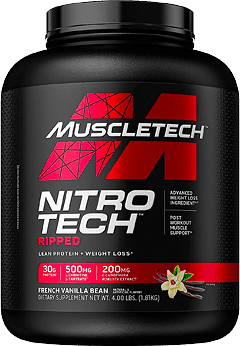
Your Answer
We are a participant in the Amazon Services LLC Associates Program, an affiliate advertising program designed to provide a means for us to earn fees by linking to Amazon.com and affiliated sites.
